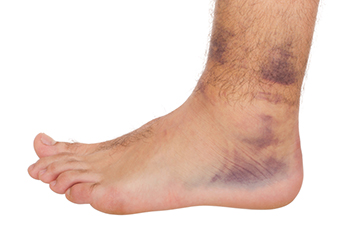
Drexel Hill (484) 521-0233
West Chester (610) 436-5883

Drexel Hill (484) 521-0233
West Chester (610) 436-5883

Ankle sprains are common injuries classified into three types based on their degree and severity. A first-degree sprain is the mildest form, involving slight stretching or microscopic tearing of the ligament fibers. Symptoms include mild pain, swelling, and stiffness, with little to no instability in the ankle joint. A second-degree sprain is more severe, characterized by partial tearing of the ligament. This type results in moderate pain, swelling, and bruising, with some difficulty bearing weight and noticeable instability in the ankle. The most severe is a third-degree sprain, where the ligament is completely torn. This causes significant pain, swelling, and bruising, in addition to a substantial loss of function and stability in the ankle. Recovery times vary depending on the severity, with mild sprains healing within a few weeks and severe sprains potentially taking several months. If you have suffered a sprained ankle, it is suggested that you consult a podiatrist who can determine what type of sprain you have endured, and offer correct treatment for it.
Although ankle sprains are common, they aren’t always minor injuries. If you need your ankle injury looked at, contact the podiatrists from Dr. Siegerman & Associates. Our doctors can provide the care you need to keep you pain-free and on your feet.
How Does an Ankle Sprain Occur?
Ankle sprains are the result of a tear in the ligaments within the ankle. These injuries may happen when you make a rapid shifting movement while your foot is planted. A less common way to sprain your ankle is when your ankle rolls inward while your foot turns outward.
What Are the Symptoms?
Preventing a Sprain
Treatment of a Sprain
In many cases, the RICE method (Rest, Ice, Compression, and Elevate) is used to treat ankle sprains. However, you should see a podiatrist to see which treatment option would work best with your injury. In severe cases, surgery may be required.
It is important to ask your doctor about rehab options after you receive treatment for your injury. Stretching, strength training, and balance exercises may help the ankle heal while also preventing further injury.
If you have any questions, please feel free to contact one of our offices located in Drexel Hill and West Chester, PA . We offer the newest diagnostic and treatment technologies for all your foot care needs.
Request a free copy of
Laser Away Foot Pain!
today.
